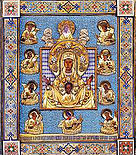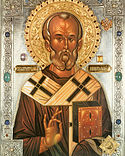Life in the St. Petersburg Diocese and the Adoption of Vasya
You ask me in your letter about our diocesan and monastic life. What shall I tell you? And how shall I express the overwhelming joy that leads us towards eternity?
The daily troubles, which we experience, cannot suppress our thought about eternity, because it is the source of our aspiration for correction. Thank God, our diocesan life progresses peacefully. From time to time, some clerics join us with their respective flock. Thus, two Ancient-Orthodox priests and their parishes joined us recently, on the basis of common faith.
We are applying our powerless efforts to praising the Name of the Lord not only in our hearts but also in our community prayers. It would be a sin to complain about monastic life, as this is the life we have chosen, this is the reason why all of us are assembled under one roof. We come from different parts of Russia, we are all different, our views and tastes differ, but we are united in our desire to jointly inherit The Kingdom of Heaven.
To my great regret, I have to leave the monastery frequently due to diocesan affairs and other church matters. Not only I myself but also other monks who live in the monastery feel sad about my absence, wishing me a prompt and unimpeded return in their prayers.
There are many slanderers who write and say wherever they can that I travel far and wide, abandoning the monastery. People who make such statements have never assembled others around Christ’s Chalice under one roof. They have never shared their last piece of bread with others. They have no clue what monastic life is to a prior. A rank-and-file monk may think that it’s not all that bad, that there is everything what’s needed for daily life, but they oftentimes don’t give a thought to where all that comes from and what kind of labor and efforts it takes to procure.
Our situation is such that one of the buildings houses the monks’ residential quarters. On these premises, we have a church, a dining hall, and cells. All entry is prohibited to the territory of the near hermitage, and it is separated by a fence. About 500 yards away, there is a pilgrimage center, where nuns and elderly, lonely female parishioners live. The main church is also located there, and on the second floor, there are guest rooms for pilgrims, and a hall, in which we conduct Orthodox conferences. Since this fall, we also have a distant hermitage, situated at a distance of 1 kilometer from the monastery, where two of our priests live.
This is how we live, while those opposed to Christ slander that we allegedly all live under one roof – monks and nuns and older laywomen. Of course, it’s not true.
Our household includes a henhouse with about 80 hens, a cowshed with two bulls and a cow, and a great number of cats. In our rural parishes, there are lonely aged women who are no longer able to put firewood into the furnace. You can probably imagine what village life is like: elderly, lonely people have to bring firewood from the shed and feed the furnace twice a day, bring pails of water from the well, and use an outdoor latrine.
We have a parish in the village of Zhabory, which is 100 kilometers from our monastery. This parish was formed in 1998, and I have ministered to it ever since. Early on, when that community consisted of many people, I lived interchangeably one week in the monastery and one week in that parish. At that time, we had a farm there, with four cows, a bull, a horse, chickens, a kitchen garden, and a hayfield. We built a house there, which we turned into a church, and we tried to live a normal parochial and community life.
In that village, there is another church, which belongs to the Moscow Patriarchate. It has several nuns but no church services, since there is no priest there. Even when there was a priest from the Moscow Patriarchate, more than half of all villagers were our, not their parishioners. We have ongoing litigation with the Moscow Patriarchate because of the building which we occupy and use it for our dining hall and cells.
Today many of our parishioners have either grown up, finished local school, married, and left for cities and towns, or passed away, moving to the tenement of Our Heavenly Father. Almost a year ago, the choir director of our parish passed away in that village. We haven’t been able lately to serve frequent liturgies there, but our parishioners have been assembling for reader services, and when Sergei Borisovich was still alive, he would read everything from the choir.
He lived with his son after having buried his wife six years ago. Sergei suffered from a mental illness, which regretfully was inherited by his son Vassily. Today Vassily is 15 years old, he is in 7th grade. He had to repeat the course – same grade twice, and he is two years behind his peers in his development, being a total orphan.
I had to face the problem of this teenager’s fate. The state has the obligation to admit him to an orphanage. However, staying in an orphanage is not a good outlook for a mentally handicapped person, from a perspective of his future adult life (I have tears in my eyes as I am writing this). On the day of his father’s death, various government officials came with the intention to take the boy away. But I prayed and decided thereafter to take the child into my guardianship. I informed the officials, and, thank God, permission was granted. They supplied me with all the necessary paperwork, then I attended guardian-family courses, received a certificate which states that I have the right to raise children as a guardian, and now Vassily is officially under my guardianship.
He and I have gone through pure hell, to put it bluntly, getting him on disability benefits. We have no right to receive these monies until he comes of age – the money is accumulated in his bank account. I pay Vassily’s expenses: the state pays me personally 90 dollars a month, plus 140 dollars a month as his allowance. (To put it in a perspective, this is what our monastery pays for electricity every month).
We went through some extremely difficult medical certification to get him individual school instruction, but we succeeded, and now he is receiving individual classes in the same school, twice a week, according to a special curriculum. His ailment will prevent him from further education: he won’t be able to become a driver or acquire some other job skills. His allowance may be cancelled upon reaching adulthood. So it remains only to rely on his own hands.
I could have transferred him to a new school, which is closer to the monastery, but I thought that a new school, with new teachers and classmates, would probably be tough on him, as some would mock at him as an “idiot”. So I decided to leave him in the same school where he had been studying for nine years. Which is, let me remind you, 100 kilometers from the monastery. So my week begins with a trip to the village of Zhabory, right after serving a liturgy at the monastery. We come to the house that I have there, and we put firewood into the furnaces: the house is really cold after being unheated for a whole week in winter. On Monday, at 7:00 am, a school bus arrives, and Vassily leaves for school. On Tuesday, we have a day off, and on Wednesday it is back to school again, after which we return to the monastery, to our normal daily life. He has a separate cell at the monastery, and our “parochial son” attends all services and obediences, gradually progressing spiritually and physically.
This fall, an 80-year-old female parishioner, Alexandra, became seriously ill, and her relatives took her to Moscow, where they said they would look after her. A month ago, her sister called me and said, “Take her back, we can’t look after her”. So we had to take her back to the monastery.
As of now, we have 13 women, including three rassophore nuns, six novice nuns, and four aged ladies; 10 men, including four monks (three hieromonks and one bishop), and six working novices – all in all 23 people who live in this monastery. Of course, we don’t live up to the name “monastery” in a strict sense of this word, but come evening, and all these God-loving souls gather for a night liturgy and pray for the whole world and for the salvation of Orthodox Christians.
Being the prior of this monastic community, I bear the responsibility to care for our 23-person-strong family, people who live and work and bear each their cross, without complaint, for the good of their neighbors. Each person in the monastery knows his or her obedience and responsibilities, and is aware that other dwellers depend on him or her. This is, in brief, how we live at our monastery.

